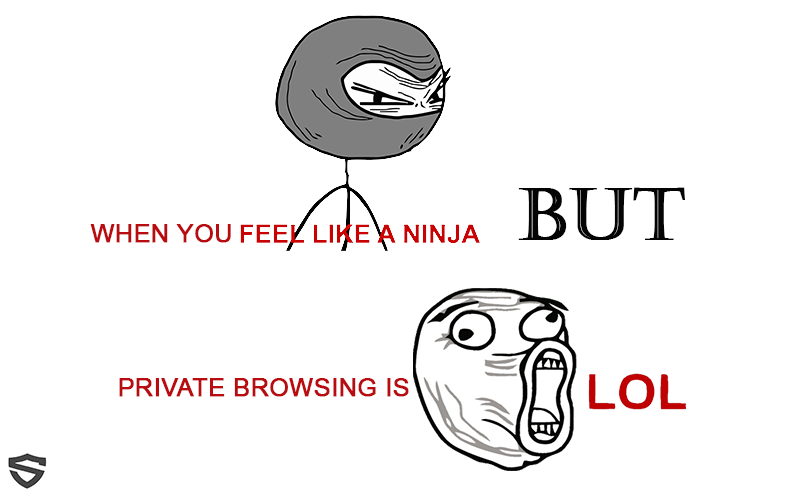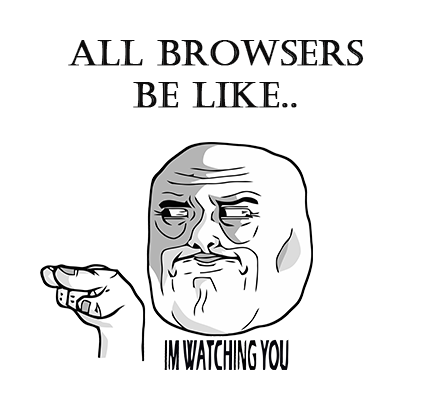Private browsing is one of the easy options to sustain some level of online confidentiality. Unfortunately, private browsing is not enough if you truly wish to remain ‘unseen’. In other words, there are several basic myths that surround private browsing mode. You should know them.

First, let us mention how private browsing is called in the most popular browsers:
- Mozilla – Private Browsing
- Google Chrome – Incognito
- Internet Explorer – InPrivate Browsing
- Microsoft Edge – InPrivate Mode
- Safari – Private Browsing
So, what are the myths we mentioned in the beginning?
Private browsing doesn’t make you entirely anonymous
If you regularly use the private browsing mode in your browser, you have definitely noticed what it says. “Please note that your employer or Internet service provider can still track the pages you visit.” The good thing is that if you share a computer with another person, they won’t be able to track down your online whereabouts. In all other cases, private browsing doesn’t make what you’re doing online private. Your ISP will always know, as well as anybody who has the authority to demand your browsing records from your ISP.
In addition, what private browsing basically does is hide your browsing history. Unfortunately, there are ways to bypass this. For example, if you download an SSL certificate from a website while using Mozilla Firefox and ‘tell’ the website to stop downloading cookies, the browser could still record such websites with specific permissions, as revealed by a 2010 Stanford University research.
Furthermore, if you use Google Chrome’s Incognito mode while logged in your Google account, Chrome will still record your activities and remember your cookies, which contradicts the privacy mode.
Your downloads will be saved, as well as your bookmarks
Whatever you have downloaded while in private mode will stay on your computer even after you end the session. Even though it will not show up in your browsing history, you better be more careful and take care of any files that may discredit the trust of your beloved ones. Or your boss for that matter.

Private browsing doesn’t spare you from being spied on
As mentioned in the beginning, your ISP keeps track of everything you do online. In addition, the incognito mode will still keep track of your IP address. Any enabled entity could track you down by obtaining your IP address.
More Must-Read Privacy Stories:
If You Were Like Bill, You May Be in Trouble!
Be Alert! It’s Data Privacy Day!
Private browsing may not work properly due to technical issues
Remember the hot story involving Microsoft Edge’s InPrivate mode? Microsoft Edge will put your privacy at stake by keeping your browsing history even in privacy mode, as revealed by security researchers. We haven’t heard of other browsers having the same issues, but it doesn’t prevent such from happening in the future. Better be safe than sorry!
So, what shall we do to be private?
Few things come to mind: VPN, socks proxy, Tor (if configured properly)…
Or simply staying off the Internet!




This is absolutely right. Private browsing is not anonymous. It is only effective for hiding data from the people who share the same device and testing website changes. For anonymity, I always opt out a VPN. Currently I am using Ivacy VPN, which I started using a few months back.
Hey Andre,
Besides VPN, have you ever considered other methods? Like alternative browsers, search engines, operating systems…
Stay with us!
STF
I know about anonymous browser TOR and search engine Duck Duck Go, but which browser is anonymous? Haven’t heard about any.
Hey there,
I don’t know if complete anonymity will ever be possible with the Internet as we know it today. However, there are alternatives to the popular browsers…
Like nightly.mozilla.org which is a better alternative to the ‘classic’ Firefox :)
There are other browsers to consider running instead of the most famous ones, like the Maxthon browser… I don’t know if it has privacy mode and is yes, how private it would be..